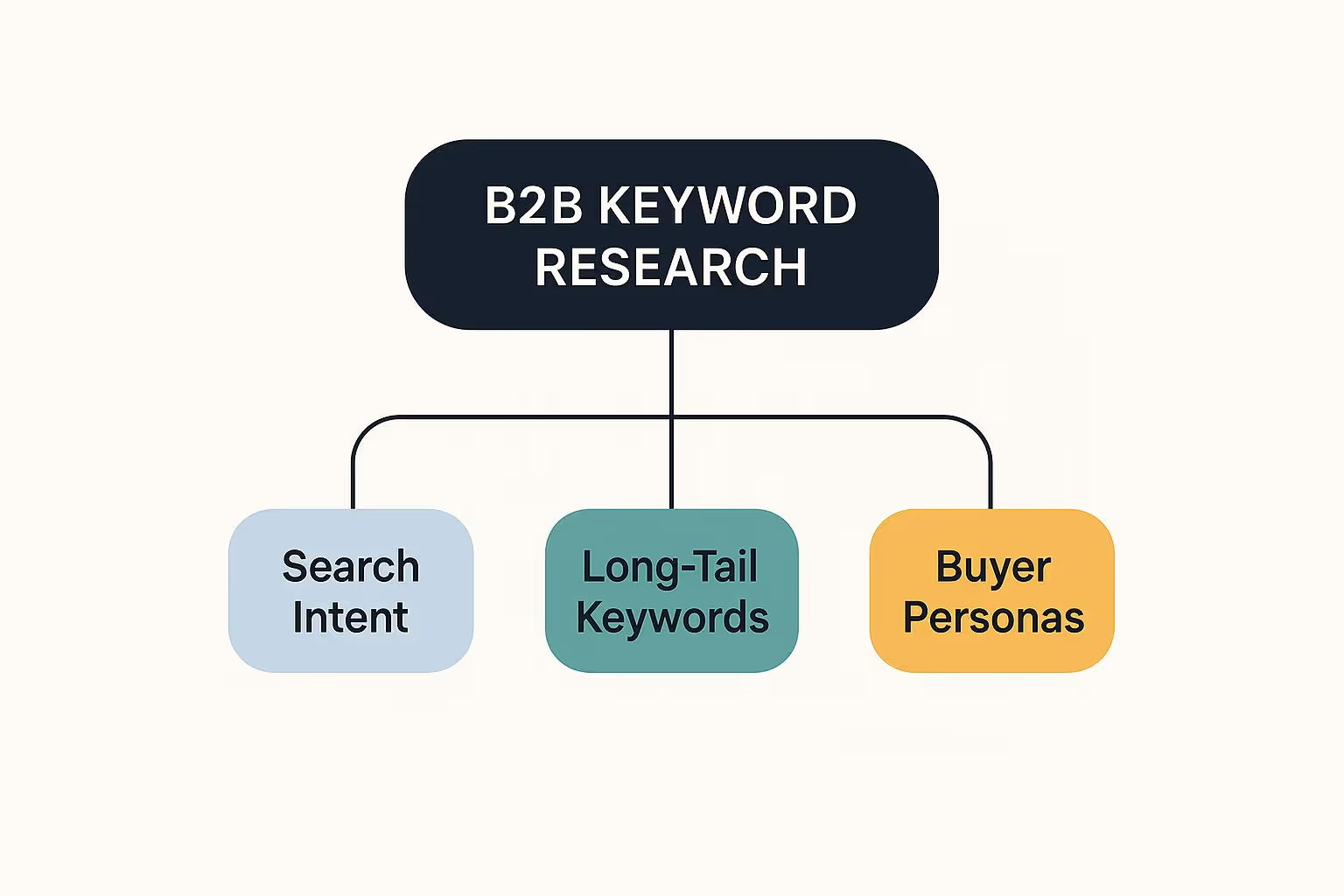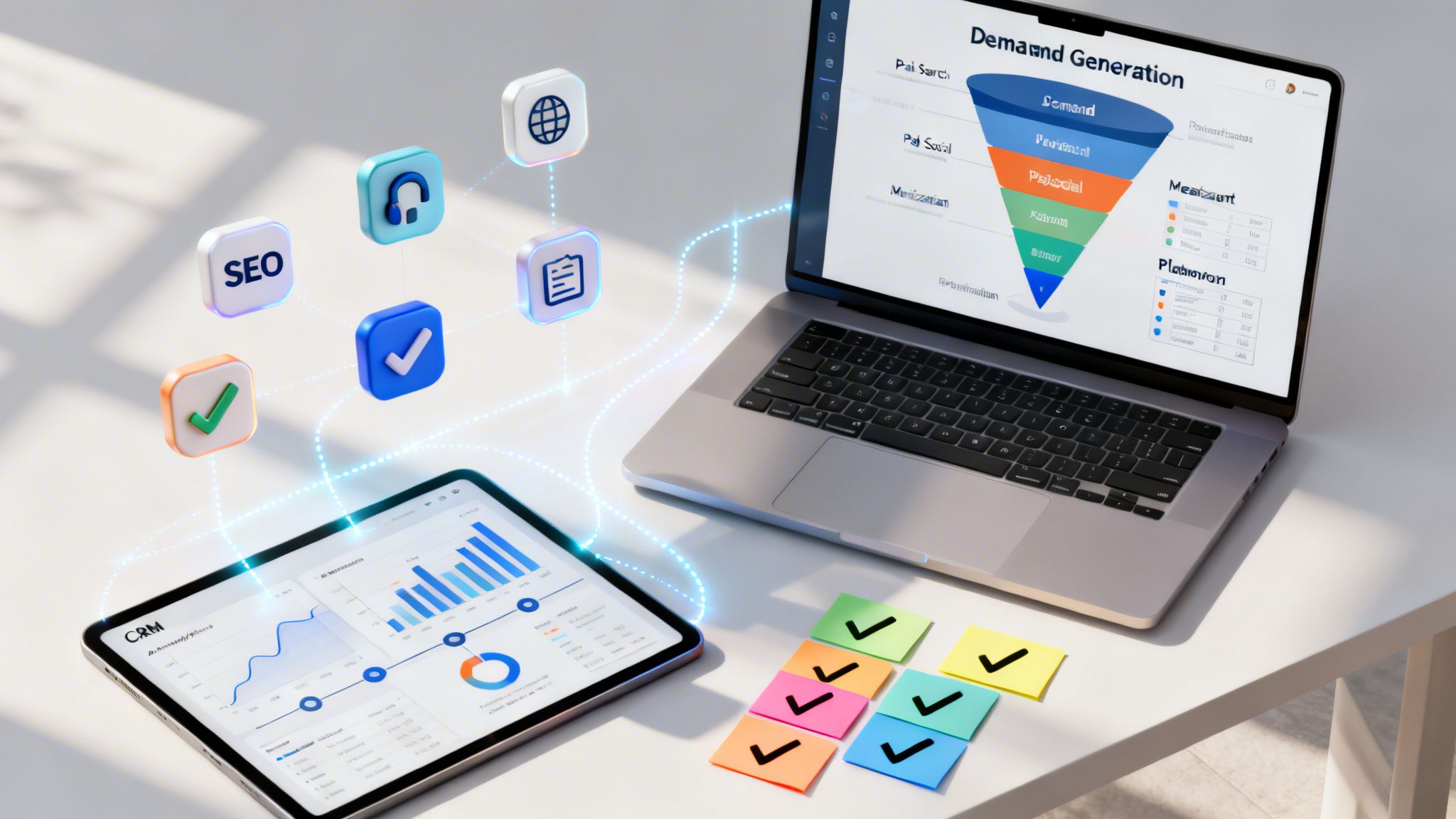At its core, B2B search engine optimization is the art and science of connecting your business with other businesses actively searching for your solutions. It’s less about a quick transaction and more about forging a long-term professional relationship, starting with a simple search query.
Unlike consumer-focused SEO, the B2B landscape targets a professional audience with highly specific, problem-oriented needs. These aren't impulse buyers; they're researchers involved in lengthy purchasing cycles, requiring input from multiple stakeholders. The objective isn't just a sale—it's to establish your company as a trusted, authoritative partner in your industry.
How B2B Search Engine Optimization Is Fundamentally Different

The marketing strategies that sell sneakers or concert tickets will almost certainly fail in the B2B space. The reason lies in the buying process itself, which is a different beast entirely. B2B SEO isn’t about setting up a digital storefront for a quick purchase; it’s about building a specialized, high-end resource library that guides prospects to the right solution.
Your ideal clients aren't casually browsing. They are actively seeking deep, credible answers to complex operational challenges. They require solutions that directly impact their company's bottom line—a decision that demands extensive research, justification, and consensus from their entire team.
The Contrast with B2C SEO
In B2C, a win is often a swift purchase sparked by a clever ad or an emotional hook. In B2B, the journey from a Google search to a signed contract is long and multifaceted. It's a marathon, not a sprint. This is where the core distinctions of B2B search engine optimization emerge:
- Longer Sales Cycles: A B2B deal can take months, involving demos, proposals, and meetings with various stakeholders. Your SEO must provide value at every step of this extended process.
- Multiple Decision-Makers: You're not just convincing one person; you're building a business case for a committee that may include a technical user, a finance manager, and a C-suite executive. Your content must address each of their unique concerns.
- High-Stakes Purchases: B2B solutions represent significant investments. Your content must build unwavering trust and clearly articulate the ROI, putting the minds of risk-averse buyers at ease.
- Informational Intent: B2B buyers are researchers first. They use search engines to educate themselves thoroughly long before they are ready to engage with a salesperson. Therefore, your SEO strategy must prioritize helpful, authoritative content over aggressive sales tactics.
The goal of B2B SEO is to capture high-intent leads long before they are ready to buy. It's about becoming the trusted resource they turn to throughout their research process, establishing your brand as the obvious choice when they are finally ready to make a decision.
Mastering this shift in mindset is the first, most crucial step. You're not just trying to rank for keywords; you're aiming to own the conversation around the problems your business solves. As we'll explore, every tactic—from keyword research to content creation—must be laser-focused on the unique needs of a professional audience.
For a deeper look at the foundational benefits, our guide on why your business needs SEO provides excellent additional context.
Mapping Your Keyword Strategy to the B2B Buyer Journey
Effective B2B search engine optimization hinges on precision. Your potential clients aren't just searching for a product; they're navigating a complex, multi-stage decision process. The key is to appear at the exact moment they need you, with content that addresses their immediate challenges and begins building the case for your solution.
This process is known as the buyer journey, typically divided into three stages: Awareness, Consideration, and Decision. Each phase has a distinct search intent, requiring a unique keyword and content strategy. Simply chasing broad, high-volume keywords is like casting a massive net into the ocean—you might catch something, but probably not the high-value client you’re actually after.
This is where a strategic B2B keyword research process becomes indispensable.

As illustrated, a winning strategy aligns search intent, long-tail keywords, and buyer personas to create a focused and effective plan.
The Awareness Stage: Problem-Focused Keywords
At the beginning of their journey, prospects aren't looking for your brand or even your type of product. They are simply becoming aware of a problem or a bottleneck in their workflow and are searching for information to understand it better. Their searches often take the form of questions or symptoms.
Your keyword strategy here should focus on informational, long-tail keywords. These are the longer, more specific phrases people use when they are in research mode.
- Keyword Examples: "how to improve warehouse inventory accuracy," "common cybersecurity threats for small businesses," or "signs of an inefficient supply chain."
- Content Match: This is the ideal stage for helpful blog posts, downloadable checklists, and educational guides that provide value without a hard sell. The goal is to be a resource and establish your authority.
By answering these top-of-funnel questions, you place your brand on their radar as a trusted expert long before they begin comparing vendors. This early touchpoint is invaluable in a long B2B sales cycle.
The Consideration Stage: Solution-Oriented Keywords
Once a buyer fully understands their problem, they enter the consideration stage. Now, they are actively researching and comparing potential solutions. Their searches become more specific, often including terms related to different software categories, methodologies, or technologies as they weigh their options.
At this point, your keyword strategy must shift from defining the problem to presenting the solution. You'll target keywords that compare different approaches or product categories.
Crucial Insight: Buyers at this stage are evaluating types of solutions, not just specific brands. Your job is to create content that positions your category of solution as the smartest choice for their problem, which naturally points them toward your specific product.
For example, a prospect might search for terms like:
- "cloud-based CRM vs on-premise"
- "automated invoicing software benefits"
- "best project management tools for engineering teams"
Your content needs to become more detailed here. Think comparison guides, white papers, case studies, and in-depth feature pages that demonstrate exactly how your type of solution addresses their specific challenges.
The Decision Stage: Brand and Purchase-Intent Keywords
Finally, in the decision stage, the buyer has narrowed their options and is ready to choose a provider. Their searches now include brand names, specific product names, and phrases that signal high purchase intent. This is where your most valuable conversions will occur.
B2B buyer behavior underscores the importance of being highly visible at this stage. A significant 66% of B2B buyers search online for specific companies or products before making a purchase. With an average of seven people involved in the final decision, your content must be sharp enough to convince an entire committee. Data shows that strong SEO performance here can lead to a sales close rate near 15%, making it essential for capturing leads at the moment of decision. You can explore more B2B buyer statistics at GreenAppleStrategy.com.
To help you put this all together, here’s a table that breaks down how different keywords align with each stage of the journey.
Keywords at this final stage are highly specific and carry clear purchase intent:
- "[Your Brand Name] pricing"
- "[Competitor Name] alternatives"
- "demo of [Your Product Name]"
- "implementation guide for [Your Service]"
Your content here must deliver direct, concise answers. This means clear pricing pages, detailed product demos, and compelling testimonials that remove final barriers and make it easy for them to take the next step.
Creating B2B Content That Builds Authority

A sharp keyword strategy is your blueprint; now it’s time to build. In B2B search engine optimization, content is the primary vehicle for demonstrating expertise and earning the trust of a discerning professional audience.
While B2C content often leverages emotion and trends, B2B content must deliver tangible, problem-solving value to be effective. The mission is to create assets that not only answer a question but also cement your brand as an indispensable resource. This requires moving beyond standard blog posts to embrace formats designed for deep engagement.
The Pillar Page and Topic Cluster Model
To effectively signal your expertise to both search engines and potential clients, one of the most powerful content structures is the pillar page and topic cluster model. This approach organizes your company's knowledge like a well-structured library rather than a random collection of articles.
A pillar page serves as a comprehensive, central guide covering a broad topic from top to bottom (e.g., "The Ultimate Guide to Supply Chain Logistics"). This page is your definitive hub on the subject.
Supporting this pillar are several topic cluster articles. These are shorter, more focused pieces that delve into specific subtopics (e.g., "How to Improve Warehouse Efficiency," "Solving Last-Mile Delivery Challenges," or "RFID vs. Barcode Systems"). Each cluster post links back to the main pillar page, creating a tightly interconnected web of content.
This model serves two key functions for B2B SEO:
- It Signals Expertise: This structure demonstrates to search engines that you possess deep, authoritative knowledge on a subject, not just a surface-level understanding.
- It Enhances User Experience: It guides visitors along a logical learning path, allowing them to explore related concepts without leaving your site.
Choosing the Right B2B Content Formats
Your audience is busy and on a mission. They need content that provides actionable insights efficiently. While a simple blog post has its place, certain formats are particularly powerful for building authority in the B2B world.
The best B2B content doesn't just inform; it educates, validates, and empowers buyers to make a confident decision. You're essentially giving them the intellectual ammunition they need to champion your solution inside their own company.
Here are a few high-impact formats to prioritize:
- Original Research Reports: Nothing builds authority faster than publishing your own data. Survey your industry, release a report with unique findings, and watch the high-quality backlinks and media mentions follow. You become the primary source.
- Comprehensive Guides and White Papers: These long-form assets allow you to tackle complex problems with the depth they deserve. A well-researched white paper can become the go-to resource for decision-makers seriously considering their options.
- Detailed Case Studies: B2B buyers want proof, not promises. Case studies provide tangible evidence of your value by telling a clear story: here was the client's problem, here’s how we solved it, and here are the hard numbers to prove it (e.g., a 35% reduction in operational costs).
- Webinars and Expert Interviews: These formats put a human face on your brand. A live webinar or a recorded discussion with an industry leader allows you to share expertise in an engaging, interactive way that builds a genuine connection with your audience.
Developing Thought Leadership Content
Thought leadership is the pinnacle of a sophisticated B2B content strategy. It’s about moving beyond explaining what your product does to shaping the conversation around why it matters. This is how you transition from being just another vendor to becoming a trusted advisor.
This requires a fundamental shift in focus. Increasingly, B2B search engine optimization is being treated as a core business function. By 2025, B2B organizations are expected to allocate around 11% of their total marketing budgets to SEO. With 23% of B2B marketers already citing organic search as their top revenue-driving channel, creating content that leads the conversation is a financial imperative, not a luxury. You can find more of these trends in this detailed B2B SEO statistics report.
To create this type of content, solve real business problems from a unique angle. Don't just report on industry news; analyze it. Offer a strong, evidence-backed perspective on where the industry is headed. This is the kind of content that influences major purchasing decisions and solidifies your position as a true leader.
Getting Technical: Mastering B2B Website SEO
A brilliant content strategy is useless if it's built on a shaky technical foundation. For B2B search engine optimization, the technical health of your website is not a background task for the IT department—it's a critical component of building trust and generating leads.
A slow, confusing, or broken website suggests a lack of attention to detail, a fatal flaw when you're asking a business to sign a five or six-figure contract. Your website is your digital headquarters. If a potential partner walked into your physical office and found flickering lights and confusing signage, they would leave. Technical SEO ensures your digital headquarters is fast, easy to navigate, and makes sense to both visitors and search engines.
Why a Healthy B2B Website is Good for Business
Technical issues are silent sales killers. A slow-loading page is a major deterrent. Studies show that even a one-second delay in page load time can cause conversion rates to plummet. When a single conversion is a demo request worth thousands, that one second becomes incredibly costly.
Conversely, a technically sound website signals professionalism and credibility. It ensures that your valuable content is discoverable, readable, and guides prospects through their buying journey without friction.
A well-optimized site doesn't just rank higher—it performs better as a business asset. It improves user experience, which builds the trust necessary to convert a researcher into a qualified sales lead.
A Practical Checklist for B2B Technical and On-Page SEO
Let's translate these concepts into action. Focus on the technical details that directly impact the B2B user experience and search engine crawlability. These aren't just boxes to check; they are strategic moves that make your value proposition clear to both people and crawlers.
Here’s a practical checklist for B2B service and solution pages:
- Logical Site Architecture: Your website’s layout should be intuitive. A prospect searching for "Enterprise Software Solutions" shouldn't have to click through five unrelated pages. Group services and solutions under clear parent categories to create a logical path.
- Blazing-Fast Site Speed: B2B buyers are busy. Optimize your images, minify code, and use a content delivery network (CDN) to ensure your pages load almost instantly. A fast site respects their time.
- Mobile-Friendliness is Non-Negotiable: Decision-makers use their phones between meetings and while traveling. Your website must function flawlessly on a smartphone, from reading a case study to submitting a contact form.
- Clean and Descriptive URLs: Compare
yourcompany.com/services/cybersecurity-consultingtoyourcompany.com/serv?id=891. The first is infinitely better because it tells users and search engines exactly what the page is about before they click.
Use Schema Markup to Stand Out from the Crowd
One of the most powerful yet underutilized tools in B2B search engine optimization is Schema markup. This code helps search engines understand your content on a deeper level, providing a significant advantage for B2B companies.
You can use specific schema types to highlight critical business information directly in search results:
- Service Schema: Clearly define your offerings, like "IT Consulting" or "Logistics Management," to help Google match you with highly relevant queries.
- FAQ Schema: Mark up the FAQ section on your service pages. This can make your questions and answers appear directly in search results, instantly establishing authority.
- Organization Schema: Reinforce your brand identity by providing search engines with clear information about your company name, logo, and contact details.
By implementing these technical and on-page optimizations, you transform your website from a simple digital brochure into a high-performing business asset that fuels your sales cycle and cements your brand's authority.
Building Authority with Strategic B2B Link Building

In B2B search engine optimization, links are more than just connections; they are votes of confidence. Every high-quality backlink is a third-party endorsement that tells search engines and potential clients that your brand is a credible, authoritative voice in your industry.
Unlike B2C link building, which can be a numbers game, the B2B approach prioritizes quality and relevance. The goal isn't to accumulate as many links as possible, but to earn placements in industry publications, partner blogs, and trade journals that your audience already trusts.
Shifting from Tactics to Relationships
Forget outdated methods like paying for links or guest posting on low-quality sites, which can damage your reputation. Modern B2B link building is akin to digital PR—it's about building genuine relationships.
The objective is to create content and digital assets so valuable that other industry leaders want to cite them. This reframes link building as a cornerstone of your brand’s reputation. Each earned link validates your expertise, strengthens your digital footprint, and exposes your content to high-value decision-makers. It’s about earning endorsements, not buying them.
Proven Strategies for Earning High-Authority Links
To build a backlink profile that moves the needle, think like a publisher. What content is so compelling it becomes a go-to resource? It comes down to creating assets that offer unique value and position your company as a primary source of information.
The most powerful B2B link-building strategies are rooted in originality. Machines can summarize existing knowledge, but they cannot create new data or form a strong, unique point of view. This is where your brand can plant its flag and earn genuine authority.
Here are proven tactics for generating high-quality B2B backlinks:
- Publish Proprietary Research: Conduct an industry survey or analyze your internal data to uncover fresh trends. When you publish an original report, you become the primary source, naturally attracting links from journalists and businesses citing your findings.
- Contribute Expert Insights: Position your company's leaders as subject matter experts available for quotes in industry articles. Being a reliable source for reporters can lead to high-authority mentions and valuable links.
- Create Ultimate Guides and Tools: Develop comprehensive resources that solve a major pain point for your audience. A free, valuable tool—like a custom calculator or a downloadable template—or a definitive guide can become a link magnet for years. For a deeper dive into foundational tactics, explore The Essential Guide to Boosting Your SEO.
By focusing on these value-driven strategies, you turn link building into a core part of your brand’s authority-building engine. Each link becomes a strategic asset that builds credibility, boosts search rankings, and drives qualified traffic from your ideal audience. This is how you win at modern B2B search engine optimization.
Measuring B2B SEO Success and Proving ROI
Proving the value of B2B search engine optimization is a long-term endeavor. Unlike B2C, where a click can lead to an instant sale, a B2B conversion may take months of research, internal meetings, and multiple decision-makers.
This means vanity metrics like keyword rankings don't tell the full story. To demonstrate real impact, you must shift your focus from surface-level data to KPIs that reflect business growth. Success isn’t just about getting more traffic; it’s about attracting the right traffic that takes the right actions.
Moving Beyond Rankings to Business Impact
A high ranking is a great start, but it's not the finish line. The true test of your B2B SEO strategy is its ability to generate qualified leads and fill the sales pipeline. The only way to build a compelling case for investment is to connect your SEO efforts directly to business outcomes.
Here are the metrics that truly matter for proving ROI:
- Qualified Organic Leads: This is your core metric. Track how many leads from organic search are deemed "sales-qualified" by your sales team. It's the most direct link between SEO and revenue.
- Conversion Rates on Key Assets: Monitor downloads of your high-value content, such as white papers, case studies, or webinar sign-ups. These actions are strong indicators of serious prospects.
- Demo and Consultation Requests: The number of organic visitors who complete a "request a demo" or "contact sales" form is a critical KPI, showing clear purchase intent.
Connecting SEO Efforts to Your Bottom Line
To illustrate the full ROI, you must connect the dots between your website analytics and your CRM. By integrating tools like Google Analytics with your CRM, you can trace a customer's entire journey, from their initial Google search to a closed deal.
This end-to-end tracking allows you to assign a real dollar value to your organic search channel. Suddenly, SEO is no longer a marketing expense but a documented revenue driver. This approach mirrors frameworks used for measuring social media ROI, where every action is tied back to its business impact.
The ultimate goal is to answer one critical question for your stakeholders: "For every dollar we invest in B2B search engine optimization, what is the return in closed business?" When you can answer that with hard data, your budget conversations change entirely.
The industry is already shifting toward more advanced measurement. By 2025, a massive 54.5% of B2B businesses plan to increase their content marketing spend, and 39% intend to invest in AI to enhance content performance and refine their SEO. This reflects a clear move toward data-driven strategies that prove their worth. You can discover more insights about B2B SEO trends on seoprofy.com.
Common Questions About B2B SEO
Diving into B2B search engine optimization often raises key questions, especially from leaders trying to understand its connection to the bigger picture. Let's address some of the most common ones.
How Long Does It Take to See Results?
Unlike B2C, where a quick traffic spike might be possible, B2B SEO is a long-term play. Realistically, you should expect to see meaningful results in 6 to 12 months.
The extended timeline is due to long B2B sales cycles and the time required to build genuine authority. You're not just ranking a page; you're earning trust through expert content and securing high-quality backlinks from respected industry players. It’s a marathon, not a sprint.
Is B2B SEO More Expensive Than B2C SEO?
The investment can be higher because the work is more specialized. Creating a groundbreaking research report or a comprehensive white paper requires significant expertise and resources.
However, the payoff is on a completely different scale. The value of a single B2B client can be astronomical, easily justifying a more focused, quality-over-quantity investment.
The real difference isn’t cost, but value. A great B2B SEO strategy is built to attract leads worth thousands, or even millions. When it works, the return on investment is incredible.
Can We Just Focus on Paid Ads Instead?
Paid search is excellent for capturing immediate demand. But the moment you stop spending, your visibility vanishes. B2B SEO is about building a sustainable, long-term asset for your business.
Think of it this way: every piece of high-authority content you publish becomes a digital employee. It works 24/7 to attract, educate, and qualify leads for years to come—long after the initial investment.
A smart strategy uses both:
- Paid Ads: To capture immediate, bottom-of-funnel demand.
- SEO: To build trust and engage prospects at every stage of their research journey.
Ultimately, a robust B2B search engine optimization plan is not just another marketing expense. It's a revenue-generating engine that builds a powerful competitive moat around your brand.
Ready to transform your B2B marketing strategy from a cost center into a predictable revenue driver? Twelverays specializes in data-driven SEO that connects directly to your bottom line. Schedule a consultation with our experts and discover how we can help you build sustainable growth.





